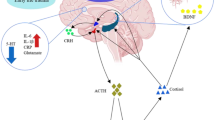Abstract
Background
This study aimed to investigate the longitudinal changes and risk factors of anxiety and depression, as well as their values in predicting major adverse cardiovascular events (MACE) occurrence in coronary heart disease (CHD) patients.
Methods
Every 3 months until 36 months (M36), 190 newly diagnosed CHD patients were consecutively recruited and followed up. Anxiety and depression were assessed using hospital anxiety and depression scale (HADS) at each follow-up timepoint. Meanwhile, MACE occurrence was recorded.
Results
Anxiety occurrence sustainably increased from 42.6% at baseline to 51.1% at M36; meanwhile, depression occurrence also sustainably elevated from 33.3% at baseline to 43.7% at M36. Then, independent risk factors for anxiety and depression at baseline/1 year/2 years/3 years were assessed, which revealed that female, diabetes, and higher Gensini score independently predicted anxiety occurrence at each time point, while single/divorced/widowed status independently predicted anxiety occurrence at some specific time points; regarding depression, female, single/divorced/widowed status, diabetes and higher Gensini score independently predicted depression occurrence at each time point, whereas higher education duration, family history of CHD and age > 60 years only predicted depression at some individual time points. Interestingly, baseline/1-year depression were correlated with increased accumulating MACE occurrence, while no correlation of baseline/1-year /2-year/3-year anxiety or 2-year/3-year depression with accumulating MACE occurrence was found.
Conclusion
Anxiety and depression are common and progress sustainably with female, diabetes, and higher Gensini score as their independent risk factors; meanwhile, depression but not anxiety may predict increased accumulating MACE occurrence in CHD patients.


Similar content being viewed by others
References
Carney RM, Freedland KE (2017) Depression and coronary heart disease. Nat Rev Cardiol 14(3):145–155
Meyer T, Hussein S, Lange HW, Herrmann-Lingen C (2014) Transient impact of baseline depression on mortality in patients with stable coronary heart disease during long-term follow-up. Clinical research in cardiology : official journal of the German Cardiac Society 103(5):389–395
Nabi H, Hall M, Koskenvuo M, Singh-Manoux A, Oksanen T, Suominen S, Kivimaki M, Vahtera J (2010) Psychological and somatic symptoms of anxiety and risk of coronary heart disease: the health and social support prospective cohort study. Biol Psychiatry 67(4):378–385
Ketterer MW, Denollet J, Chapp J, Thayer B, Keteyian S, Clark V, John S, Farha AJ, Deveshwar S (2004) Men deny and women cry, but who dies? Do the wages of “denial” include early ischemic coronary heart disease? J Psychosom Res 56(1):119–123
Murphy B, Le Grande M, Alvarenga M, Worcester M, Jackson A (2019) Anxiety and depression after a cardiac event: prevalence and predictors. Front Psychol 10:3010
Pajak A, Jankowski P, Kotseva K, Heidrich J, de Smedt D, De Bacquer D, Group ES (2013) Depression, anxiety, and risk factor control in patients after hospitalization for coronary heart disease: the EUROASPIRE III study. Eur J Prev Cardiol 20(2):331–340
Chen YY, Xu P, Wang Y, Song TJ, Luo N, Zhao LJ (2019) Prevalence of and risk factors for anxiety after coronary heart disease: systematic review and meta-analysis. Medicine 98(38):e16973
Sverre E, Peersen K, Weedon-Fekjaer H, Perk J, Gjertsen E, Husebye E, Gullestad L, Dammen T, Otterstad JE, Munkhaugen J (2020) Preventable clinical and psychosocial factors predicted two out of three recurrent cardiovascular events in a coronary population. BMC Cardiovasc Disord 20(1):61
Snaith RP (2003) The hospital anxiety and depression scale. Health Qual Life Outcomes 1:29
Greenwood JP, Herzog BA, Brown JM, Everett CC, Nixon J, Bijsterveld P, Maredia N, Motwani M, Dickinson CJ, Ball SG, Plein S (2016) Prognostic value of cardiovascular magnetic resonance and single-photon emission computed tomography in suspected coronary heart disease: long-term follow-up of a prospective, diagnostic accuracy cohort study. Ann Intern Med 165(1):1–9
Cohen BE, Edmondson D, Kronish IM (2015) State of the art review: depression, stress, anxiety, and cardiovascular disease. Am J Hypertens 28(11):1295–1302
Linke SE, Rutledge T, Johnson BD, Vaccarino V, Bittner V, Cornell CE, Eteiba W, Sheps DS, Krantz DS, Parashar S, Bairey Merz CN (2009) Depressive symptom dimensions and cardiovascular prognosis among women with suspected myocardial ischemia: a report from the National Heart, Lung, and Blood Institute-sponsored Women’s ischemia syndrome evaluation. Arch Gen Psychiatry 66(5):499–507
Buchberger B, Huppertz H, Krabbe L, Lux B, Mattivi JT, Siafarikas A (2016) Symptoms of depression and anxiety in youth with type 1 diabetes: a systematic review and meta-analysis. Psychoneuroendocrinology 70:70–84
Gravely-Witte S, De Gucht V, Heiser W, Grace SL, Van Elderen T (2007) The impact of angina and cardiac history on health-related quality of life and depression in coronary heart disease patients. Chronic illness 3(1):66–76
Richards SH, Anderson L, Jenkinson CE, Whalley B, Rees K, Davies P, Bennett P, Liu Z, West R, Thompson DR, Taylor RS (2018) Psychological interventions for coronary heart disease: Cochrane systematic review and meta-analysis. Eur J Prev Cardiol 25(3):247–259
Brydon L, Magid K, Steptoe A (2006) Platelets, coronary heart disease, and stress. Brain Behav Immun 20(2):113–119
Author information
Authors and Affiliations
Corresponding author
Ethics declarations
The study was approved by the Institutional Review Board of The Second Affiliated Hospital of Harbin Medical University, and it was conducted in accordance with the provisions of the Declaration of Helsinki and Good Clinical Practice Guidelines. All patients or their families signed informed consents.
Conflict of interest
The authors declare that they have no conflicts of interest.
Ethical approval
The study was approved by the Institutional Review Board of our hospital, and it was conducted in accordance with the provisions of the Declaration of Helsinki and Good Clinical Practice Guidelines.
Informed consent
All patients or their families signed informed consents.
Additional information
Publisher’s note
Springer Nature remains neutral with regard to jurisdictional claims in published maps and institutional affiliations.
Rights and permissions
About this article
Cite this article
Wang, D., Dai, F., Liu, W. et al. Longitudinal change and prognostic value of anxiety and depression in coronary heart disease patients. Ir J Med Sci 190, 107–116 (2021). https://doi.org/10.1007/s11845-020-02302-7
Received:
Accepted:
Published:
Issue Date:
DOI: https://doi.org/10.1007/s11845-020-02302-7




